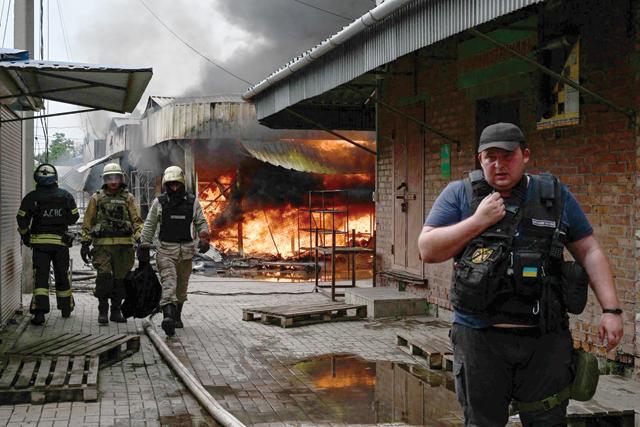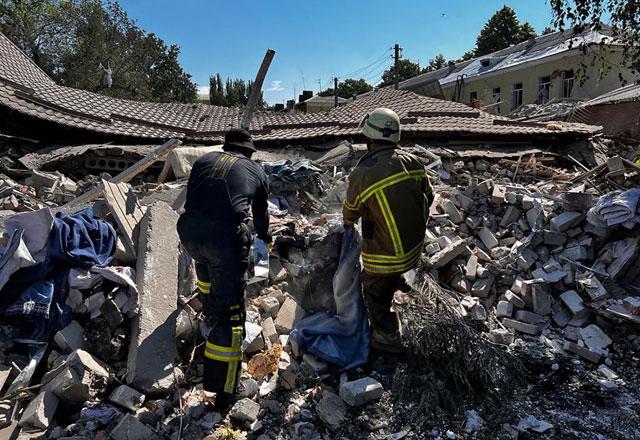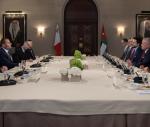You are here
Russia orders troops out of Kherson in major reversal
By AFP - Nov 09,2022 - Last updated at Nov 09,2022
MOSCOW — Russia ordered its troops to withdraw from the city of Kherson in southern Ukraine on Wednesday in a further major blow to its campaign amid a Ukrainian counter-offensive.
"Begin to pull out troops," Russian Defence Minister Sergei Shoigu said at a televised meeting with Russia's commander in Ukraine, Sergei Surovikin.
The commander had proposed the "difficult decision" of pulling back from the city and setting up defences on the eastern bank of the Dnipro River.
Kherson city was the first urban hub captured by Russia during its "special military operation" and the only regional capital controlled by Moscow's forces since the offensive began on February 24.
Ukraine's troops have for weeks been capturing villages en route to the city near the Black Sea and Kremlin-installed leaders in Kherson have been pulling out civilians.
But Ukraine responded with scepticism to the Russian announcement.
Ukrainian presidential adviser Mykhaylo Podolyak said some Russian troops remained in the city.
"We see no signs that Russia is leaving Kherson without a fight," he said on Twitter.
"Ukraine is liberating territories based on intelligence data, not staged TV statements."
Kremlin supporters meanwhile rushed to justify the decision.
The head of Russian state media group RT, Margarita Simonyan, said the retreat was necessary in order not to leave Russian troops exposed on the west bank of the Dnipro River and “open the way to Crimea”.
Chechen strongman Ramzan Kadyrov said the decision was “difficult but fair”.
Putin ally Yevgeny Prigozhin, who is the founder of the Wagner mercenary group and has been critical of Russia’s military strategy in the campaign, was more ambiguous.
“It is important not to agonise, not to beat around in paranoia, but to draw conclusions and work on mistakes,” his press service wrote on social media.
115,000 civilians removed
Russia losing the Kherson region would return Ukraine important access to the Sea of Azov and leave President Vladimir Putin with little to show from a campaign that has turned him into a pariah in the eyes of the West.
The retreat will put pressure on Russian control of the rest of the Kherson region, which forms a land bridge from Russia to Crimea, the peninsula which Moscow annexed in 2014.
Kherson was one of four Ukrainian regions that Russia declared it had annexed in September, shortly after being forced to withdraw from swathes of territory in the north-eastern Kharkiv region.
The announcement of the retreat came just hours after officials said the Moscow-installed deputy head of the Kherson region, Kirill Stremousov, a key supporter of annexation, had died in a car crash.
As Ukrainian troops have gradually advanced in the south, Surovikin told Shoigu on Wednesday that some 115,000 people had been removed from the western bank of the Dnipro, which includes Kherson city.
“We have done everything possible for our part to ensure their safety during the evacuation,” Surovikin said in a report broadcast on the state-run Rossiya-24 television channel.
Ukraine has defined these population movements towards Russia or Russian-occupied territory as “deportations”.
‘Strong bipartisan support’
With the Russian offensive now in its ninth month, Western powers have stepped up military and financial support for Kyiv.
In the latest announcement, the European Commission on Wednesday proposed an 18 billion-euro ($18 billion) aid package for Ukraine in 2023 in the form of loans.
Ukrainian President Volodymyr Zelensky hailed the aid as “true solidarity”.
The Kremlin said that relations between Moscow and Washington would remain “bad” after the US midterm elections.
“Our existing ties are bad, and they will remain bad,” Kremlin spokesman Dmitry Peskov was quoted as saying by Russian news agencies.
US President Joe Biden, who has been a key ally to Kyiv and provided weapons and financial backing, could be constrained in his support for Ukraine if Republicans win majorities the Senate and the House of Representatives.
But NATO chief Jens Stoltenberg denied the Republicans’ advance would undermine Western military backing for Ukraine.
After talks with UK Prime Minister Rishi Sunak, Stoltenberg said: “It’s absolutely clear that there’s strong bipartisan support in the United States for a continued support for Ukraine and that’s not changed.”
Related Articles
SLOVIANSK — Fighting raged on Tuesday in and around Ukraine's eastern Donbas region as Russian troops tried to build on recent battlefield g
KHERSON, Ukraine — Ukrainians in the liberated southern city of Kherson expressed relief on Sunday after months of Russian occupation.Reside
KYIV — Ukraine on Wednesday said it had restarted operations at its blockaded Black Sea ports as it moved closer to resuming grain exports w

















